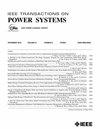实现抗御野火的自适应配电网:基于双滚动地平线的框架
IF 7.2
1区 工程技术
Q1 ENGINEERING, ELECTRICAL & ELECTRONIC
引用次数: 0
摘要
最近,野火对电力系统的安全性和可靠性构成了重大威胁,促使人们制定创新型框架以增强抗灾能力。现有文献主要集中于使用缺乏必要的动态来有效解决不确定性的随机优化模型进行服务恢复。为了解决这一问题,该公司利用双滚动水平优化(DRHO)设计了一种智能弹性控制器(SRC),以减轻野火造成的配电网中断。该系统可以动态监测和分析野火的时空行为,如强度、到达时间、从火源到电气设备的结合路径等。这样,它可以在野火到达配电线路之前主动采取实时纠正措施。主要目标是通过重新配置网络和使用在主从控制方案下运行的固定和移动分布式能源(mder)的混合,最大限度地减少负载和运营成本。通过不同的案例研究验证了基于drho的SRC的有效性,并与基于场景的方法进行了比较。考虑到艾伯塔省野火的真实数据,仿真结果证明了该解决方案对不确定性的鲁棒性,显著减少了停电,并确保了增强的弹性。本文章由计算机程序翻译,如有差异,请以英文原文为准。
Towards Resilient Self-Proactive Distribution Grids Against Wildfires: A Dual Rolling Horizon-Based Framework
Wildfires have recently posed a significant danger to the security and reliability of electrical power systems, prompting the development of innovative frameworks for enhanced resilience. Existing literature has primarily focused on service restoration using stochastic optimization models that lack the necessary dynamism to tackle uncertainties effectively. To address this problem, a Dual Rolling horizon optimization (DRHO) is utilized to devise a smart resilience controller (SRC) that mitigates distribution network outages caused by wildfire disruptions. The proposed SRC can dynamically monitor and analyze the spatiotemporal behaviors of wildfires, such as their intensity, arrival time, and binding pathways from their ignition sources to electrical equipment. In doing so, it can proactively take real-time corrective measures before the wildfire reaches power distribution lines. The primary objective is to minimize load shedding and operational costs through re-configuring the network and employing a mix of stationary and mobile distributed energy resources (MDERs) that operate under a master-slave control scheme. The effectiveness of the proposed DRHO-based SRC is validated through diverse case studies and is compared against scenario-based approaches. Considering real-world data of Alberta wildfires, simulation results demonstrate the proposed solution's robustness to uncertainties, significantly reducing power outages and ensuring enhanced resilience.
求助全文
通过发布文献求助,成功后即可免费获取论文全文。
去求助
来源期刊

IEEE Transactions on Power Systems
工程技术-工程:电子与电气
CiteScore
15.80
自引率
7.60%
发文量
696
审稿时长
3 months
期刊介绍:
The scope of IEEE Transactions on Power Systems covers the education, analysis, operation, planning, and economics of electric generation, transmission, and distribution systems for general industrial, commercial, public, and domestic consumption, including the interaction with multi-energy carriers. The focus of this transactions is the power system from a systems viewpoint instead of components of the system. It has five (5) key areas within its scope with several technical topics within each area. These areas are: (1) Power Engineering Education, (2) Power System Analysis, Computing, and Economics, (3) Power System Dynamic Performance, (4) Power System Operations, and (5) Power System Planning and Implementation.
 求助内容:
求助内容: 应助结果提醒方式:
应助结果提醒方式:


